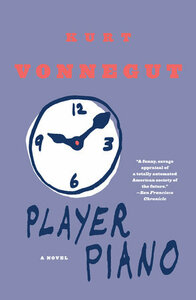You need to sign in or sign up before continuing.
Take a photo of a barcode or cover
I usually like Vonnegut books, but found it really tough to get through this one. Almost stopped midway through. Not sure why, this one just didn’t click with me.
funny
lighthearted
reflective
medium-paced
funny
lighthearted
reflective
medium-paced
Plot or Character Driven:
Character
Strong character development:
Yes
Loveable characters:
Yes
Diverse cast of characters:
No
Flaws of characters a main focus:
Yes
adventurous
dark
mysterious
reflective
tense
fast-paced
Plot or Character Driven:
A mix
Strong character development:
Yes
Loveable characters:
No
Diverse cast of characters:
No
Flaws of characters a main focus:
Yes
adventurous
funny
reflective
slow-paced
Plot or Character Driven:
A mix
Strong character development:
Yes
Loveable characters:
No
Diverse cast of characters:
No
Flaws of characters a main focus:
Yes
dark
reflective
tense
slow-paced
Plot or Character Driven:
A mix
Strong character development:
Yes
Loveable characters:
Complicated
Diverse cast of characters:
Yes
Flaws of characters a main focus:
Yes
Review of “Player Piano”
By: Kurt Vonnegut
In this speculative fiction, the United States won WWIII with the use of machines and ultimately became a society that only used machines. The U.S. developed a class division system based on IQ to determine who was smart enough to run the machines. Dr. Paul Proteus, a manager at his company, Ilium Works, was expected to follow in his father, George Proteus’ footsteps, but had felt dissatisfaction with his job and life. He wondered if a world run by machines was the best way to run society.
“Player Piano” explored themes of a heavy reliance on automation to run things, and the consequences of it. This reliance on machines resulted in a class system based on IQ; those who were intelligent enough to operate the technology, and those who could not. Paul, our main character, worked at Ilium Works, the company that ran the machines in New York City. His friend and former Ilium employee, Ed Finnerty, returned to town and was seen as a threat to the company. Finnerty was too smart for his own good and had questioned the companies’ intentions. Kroner, Paul’s boss, didn’t trust Finnerty, and didn’t like how Paul let Finnerty into Ilium Works where he had access to the machines without an escort. Paul’s wife, Anita, who originated from a lower class area in the city, also didn’t like Finnerty. She saw him as a bad influence on Paul and was disgusted by him. Anita’s and Kroner ‘s suspicions aren’t wrong, because it was Finnerty and his alliance with Reverend James J. Lasher, that got Paul to question things. Lasher was the only college educated man living in the lower class area of the city, giving him the insightfulness to criticize the class system. Lasher and Finnerty’s ideas got inside Paul’s head causing him to question if he liked his job. He proposed the idea to his wife, Anita, to live in a farm house without machines, but she wasn’t receptive to the idea and tried to talk him out of it.
Paul’s marriage to Anita was imperfect. They said, “I love you”, but it was habitual and routine. Anita pushed him to take a promotion that he had been hesitant to take. Anita loved their lifestyle, having come from the lower class neighborhood. She enjoyed the life of leisure that the world with machines allowed, and she was incapable of living a life without them. Before they had visited the farm house, Paul took Anita through the neighborhood she grew up in as a reminder of how lucky they were, but it has the opposite effect. She believed Paul was trying to punish and traumatize her. She became upset. This was the first moment that proved their marriage was no longer working.
When Finnerty came back into town she tried to convince Paul that he could not be trusted. Paul was determined to trust his friend. Kroner suspects, Finnerty and Lasher were part of a secret group known as the Ghost Shirt Society and his suspicions prove correct. Finnerty and Lasher represented the concept of anti-machines and how reliance on machines made humans obsolete. Anita’s and Kroner’s trying to turn Paul against Finnerty that persuade him to admit his dissatisfaction.
This book had me thinking about our world and how it related to our over-reliance on technology, particularly social media, and how we spend most of our time on our cell phones and laptops. Vonnegut couldn’t predict the existence of the internet and social media, but this explores the same concerns society today.
sci-fi is unfortunately not my thing and this “technology as a threat” plot has obviously been done better by a lot of other books. still i found this fun to read while also being darkly foreshadowing. parts of this dragged but the ending made it a lot better, loved that it wasn’t an unrealistic “and everything worked out” ending, especially because other parts of it already felt difficult to fully buy into. i understand what he was doing with anita i think but it still felt like she was not the most well written character to me. (also the shah storyline??). anyway excited to read more vonnegut to see how his writing changed since this felt very different than SH5. it seems most people don’t recommend reading this before you’ve read his other works but i’m kinda glad i did anyway so i can appreciate the progression of his writing/ideas.
that’s all except “he fills me full of lie down and die” is my new favorite sentence
that’s all except “he fills me full of lie down and die” is my new favorite sentence
adventurous
dark
emotional
funny
hopeful
mysterious
reflective
medium-paced
adventurous
dark
emotional
mysterious
reflective
tense
medium-paced
Plot or Character Driven:
A mix
Strong character development:
Complicated
Loveable characters:
Complicated
Diverse cast of characters:
Yes
Flaws of characters a main focus:
Complicated
Had this book for book club, but I’m abandoning at 30% in and going to read some summaries. I think there are great themes, especially for a book written in 1952, that reflect on our relationship with technology, I just struggle with Vonnegut’s style and roundabout way to make a point. Lots of great quotes but just not a book for me.




